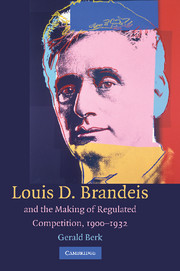Book contents
- Frontmatter
- Contents
- Figures and Tables
- Acknowledgments
- 1 Creative Syncretism
- PART I BRANDEIS AND THE THEORY OF REGULATED COMPETITION
- 2 Republican Experimentalism and Regulated Competition
- 3 Learning from Railroad Regulation
- 4 The Origins of an Ambiguous Federal Trade Commission
- PART II REGULATED COMPETITION IN PRACTICE
- PART III REGULATED COMPETITION CONTESTED
- PART IV CONCLUSION
- Appendix Industries and Number of Associations with at Least Substantial Involvement in Developmental Association, by Industry Group
- Index
2 - Republican Experimentalism and Regulated Competition
Published online by Cambridge University Press: 23 November 2009
- Frontmatter
- Contents
- Figures and Tables
- Acknowledgments
- 1 Creative Syncretism
- PART I BRANDEIS AND THE THEORY OF REGULATED COMPETITION
- 2 Republican Experimentalism and Regulated Competition
- 3 Learning from Railroad Regulation
- 4 The Origins of an Ambiguous Federal Trade Commission
- PART II REGULATED COMPETITION IN PRACTICE
- PART III REGULATED COMPETITION CONTESTED
- PART IV CONCLUSION
- Appendix Industries and Number of Associations with at Least Substantial Involvement in Developmental Association, by Industry Group
- Index
Summary
The election of 1912 divided antitrust reformers and Louis Brandeis proposed to unite them. Populist Democrats hoped to decentralize economic power by enforcing competition. Progressive Republicans accepted the concentration of economic power, but wanted to regulate it with an independent commission. Louis Brandeis offered a third way. Neither self-regulating markets nor regulated monopoly, regulated competition would harness a regulatory commission and civil society to channel rivalry from predation into improvements in products and production processes. By recomposing the relationship between public administration and competition, Brandeis's proposal promised to reconcile the populist desire for decentralized power with the progressive desire for administrative mastery and economic progress.
The contest over antitrust reform raised fundamental questions of narrative identity and cultural authority. It would not be won or lost by technical considerations alone. The election of 1912 turned on who spoke most directly to U.S. anxieties over the relationship among economic prosperity, democracy, and power. But cultural conflict seemed mired in irreconcilable differences in 1912: populists lashed out at progressives for capitulating to despotic power; progressives charged populists with unwarranted faith in individualism and self-regulating markets. Reconciliation promised immense political vitality and Brandeis took up the challenge. He disassembled ancient republican fears of monopoly power and recombined their parts with modern faith in science in a cultural schema I call republican experimentalism.
This chapter situates, explains, and defends republican experimentalism and regulated competition. The first part situates Brandeis's approach within a debate between populists and progressives – a debate that was structured by the U. S. Supreme Court.
- Type
- Chapter
- Information
- Publisher: Cambridge University PressPrint publication year: 2009



